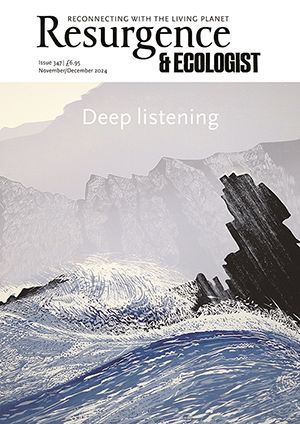One of the penalties of an ecological education”, wrote Aldo Leopold in 1949, “is that one lives alone in a world of wounds.” Never has this truth been more apparent to me than while reading Kate Bradbury’s One Garden Against the World.
“Part memoir and part call to arms”, it charts a year in the life of Bradbury’s garden at her small Victorian terrace in Portslade-on-Sea, just outside of Brighton. Bradbury is a renowned gardener and an author of several books – an inspiration for what can be done with just a small patch of land. She gardens for wildlife, her borders bursting with native wild flowers, her hedgehog boxes inhabited with hogs from the local rescue centre, her pond teeming with tadpoles and backswimmers. When she sits on her bench on a summer evening, a beer in hand and her dog beside her, it is impos-sible not to feel envious of this little slice of Eden that she has carved out of the suburban sprawl around her.
And yet all is not well. The book begins in the spring of 2022, the land already deep in drought, and as the months roll on things do not improve. Hedgehogs struggle to get a drink. Birds struggle to feed their chicks. Bees struggle to find food. Since the 1970s we have lost 33% of our common moths and 73 million birds. In two decades, 60% of our insects have vanished. Everything is struggling, and with Bradbury’s fingers in the soil every day, attuned to the many species that make use of her backyard, their struggles are impossible for her to ignore.
As much as this is a book about a garden, it is also a book about eco-anxiety. Even in somewhere as apparently temperate as the south-east coast of England, the spectre of the climate crisis can be felt as a daily threat for anyone who is paying enough attention. Bradbury worries constantly about how things are unravelling. In July, the UK registers its first 40C day, and she finds it impossible to focus on her work. She worries about depressing her friends who just want to enjoy the sunshine, but what about the hedgehogs? Her concern is oppressive – too much at times – but that is only because we would all like to look away. The climate crisis is already making a real impact on Bradbury’s life because she is unable to ignore what is happening before her eyes.
Her antidote is to garden. Bradbury’s manifesto is as inspiring as it is achievable. There are 30 million gardens in the UK. Plenty are entombed beneath paving and plastic grass; others contain little more than perfect lawns. That is an astonishing amount of habitat being wasted. To garden for wildlife is to invite it in, to offer 30 million sanctuaries in a rapidly changing world. Surrounded by urbanisation, beset by droughts and downpours, a pond, a swift box or a compost heap can make all the difference to whether a creature, and ultimately a species, lives or dies.
There are no easy fixes. I think we know that by now. But when a destabilising climate and intractable politics feel impossible to address, we can begin by creating habitat outside our back doors. For the aspiring rewilder, there is a wealth of ideas here. And when Bradbury helps a pair of robins fledge their chicks, or a newt find a home in a street otherwise empty of ponds, it is evident to even the most cynical that an individual can truly make a difference. If we all gardened like Bradbury, the world could still become a very different place.
One Garden Against the World: In Search of Hope in a Changing Climate by Kate Bradbury. Bloomsbury Wildlife, 2024. ISBN: 9781399408868







